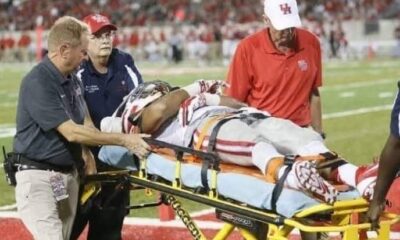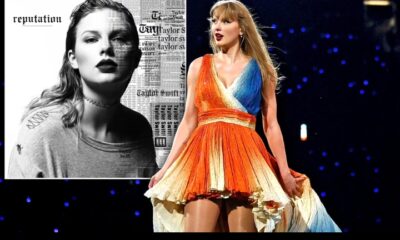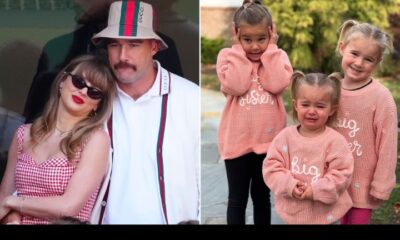CELEBRITY
Breaking News:Taylor Swift lose over 100 million followers after the Kamala Harris endorsement? Viral post debunked “She lost something else Full details below
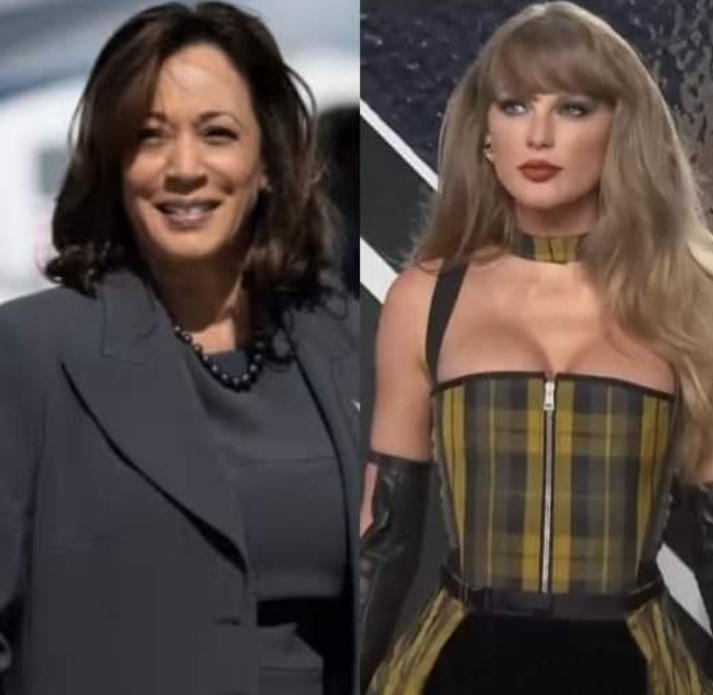
Breaking News:Taylor Swift lose over 100 million followers after the Kamala Harris endorsement? Viral post debunked “She lost something else Full details below Published 1 day ago on September 14, 2024By Helen Winslet.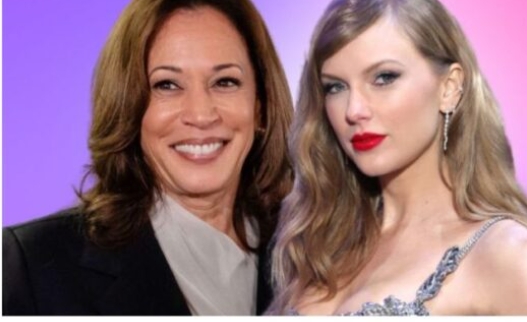
Music generates passion and emotion, so it’s little surprise that popular tunes have been featured in presidential contests since the days of George Washington and Thomas Jefferson.
But as a scholar of music’s role in American politics and patriotism, I’ve never seen music assume as much electoral importance as it has in recent months.
Taylor Swift’s endorsement of Kamala Harris is headline news, as were the mere rumors that Beyoncé might perform at the Democratic National Convention. Donald Trump, too, has his pop culture supporters, including Kid Rock and Lee Greenwood.
In a tight race, music has the potential to make a big difference. Most voters today have already made up their minds, and the presidential race remains a statistical dead heat, according to polls. In this situation, I think music offers a deceptively simple, emotional hook that can inspire the party base without alienating those few undecideds in the middle.
I’m
When crowd size matters, getting your supporters to sing, scream and dance can cultivate an aura of electoral triumph.
Music had a starring role in this year’s dueling nominating conventions.
Beyond the expected fare of the national anthem and the background music that filled the voids between speakers, pop hits were used to transform each party’s typically tedious state-by-state roll call. When Florida’s 125 votes took Trump over the top, confirming that he would be the official Republican nominee, organizers played Kool & The Gang’s 1980 No. 1 hit, “Celebration.”
Breaking News:Taylor Swift lose over 100 million followers after the Kamala Harris endorsement? Viral post debunked “She lost something else .
Music generates passion and emotion, so it’s little surprise that popular tunes have been featured in presidential contests since the days of George Washington and Thomas Jefferson.
But as a scholar of music’s role in American politics and patriotism, I’ve never seen music assume as much electoral importance as it has in recent months.
Taylor Swift’s endorsement of Kamala Harris is headline news, as were the mere rumors that Beyoncé might perform at the Democratic National Convention. Donald Trump, too, has his pop culture supporters, including Kid Rock and Lee Greenwood.
In a tight race, music has the potential to make a big difference. Most voters today have already made up their minds, and the presidential race remains a statistical dead heat, according to polls. In this situation, I think music offers a deceptively simple, emotional hook that can inspire the party base without alienating those few undecideds in the middle.
When crowd size matters, getting your supporters to sing, scream and dance can cultivate an aura of electoral triumph.
Music had a starring role in this year’s dueling nominating conventions.
Beyond the expected fare of the national anthem and the background music that filled the voids between speakers, pop hits were used to transform each party’s typically tedious state-by-state roll call. When Florida’s 125 votes took Trump over the top, confirming that he would be the official Republican nominee, organizers played Kool & The Gang’s 1980 No. 1 hit, “Celebration.”
Over at the Democratic convention, celebrity emcee DJ Cassidy turned the relatively banal proceedings of the roll call into a dance party. As each state and territory was called to vote, a signature song burst forth to introduce, welcome and energize the crowd. Alabama’s call-out was Lynyrd Skynyrd’s “Sweet Home Alabama,” Eminem’s “Lose Yourself” announced Michigan, while California featured the music of native emcees Dr. Dre and Snoop Dogg.
And in a moment designed to go viral, Atlanta native and crunk rapper Lil’ Jon answered the call for Georgia with the guttural shout “Heyaaah … ” followed by the opening lyrics of his party anthem “Turn Down for What?”
Soon afterward, Axios posted a full Democratic convention roll call playlist on Spotify, and its 61 songs showcase a tactical musical advantage held by Democrats.
None of the artists featured at that convention have publicly objected to their songs being used. In contrast, dozens of musical artists have disavowed Trump’s use of their music at rallies. In 2024 alone, they include ABBA, Adele, Celine Dion, Foo Fighters, Jack White and the heirs of Isaac Hayes.
Rather than fulminate against these slights, Trump world seems to embrace the headlines they generate. The objections of these artists reinforce the candidate’s trademark outsider status, and are yet another sign that he and his supporters are scorned by the nation’s political and cultural elites.
Breaking News:Taylor Swift lose over 100 million followers after the Kamala Harris endorsement? Viral post debunked “She lost something else Full details below
Music generates passion and emotion, so it’s little surprise that popular tunes have been featured in presidential contests since the days of George Washington and Thomas Jefferson.
But as a scholar of music’s role in American politics and patriotism, I’ve never seen music assume as much electoral importance as it has in recent months
Taylor Swift’s endorsement of Kamala Harris is headline news, as were the mere rumors that Beyoncé might perform at the Democratic National Convention. Donald Trump, too, has his pop culture supporters, including Kid Rock and Lee Greenwood.
In a tight race, music has the potential to make a big difference. Most voters today have already made up their minds, and the presidential race remains a statistical dead heat, according to polls. In this situation, I think music offers a deceptively simple, emotional hook that can inspire the party base without alienating those few undecideds in the middle.
When crowd size matters, getting your supporters to sing, scream and dance can cultivate an aura of electoral triumph.
Music had a starring role in this year’s dueling nominating conventions.
Beyond the expected fare of the national anthem and the background music that filled the voids between speakers, pop hits were used to transform each party’s typically tedious state-by-state roll call. When Florida’s 125 votes took Trump over the top, confirming that he would be the official Republican nominee, organizers played Kool & The Gang’s 1980 No. 1 hit, “Celebration.”
Over at the Democratic convention, celebrity emcee DJ Cassidy turned the relatively banal proceedings of the roll call into a dance party. As each state and territory was called to vote, a signature song burst forth to introduce, welcome and energize the crowd. Alabama’s call-out was Lynyrd Skynyrd’s “Sweet Home Alabama,” Eminem’s “Lose Yourself” announced Michigan, while California featured the music of native emcees Dr. Dre and Snoop Dogg.
And in a moment designed to go viral, Atlanta native and crunk rapper Lil’ Jon answered the call for Georgia with the guttural shout “Heyaaah … ” followed by the opening lyrics of his party anthem “Turn Down for What?”
Soon afterward, Axios posted a full Democratic convention roll call playlist on Spotify, and its 61 songs showcase a tactical musical advantage held by Democrats.
None of the artists featured at that convention have publicly objected to their songs being used. In contrast, dozens of musical artists have disavowed Trump’s use of their music at rallies. In 2024 alone, they include ABBA, Adele, Celine Dion, Foo Fighters, Jack White and the heirs of Isaac Hayes.
Rather than fulminate against these slights, Trumpworld seems to embrace the headlines they generate. The objections of these artists reinforce the candidate’s trademark outsider status, and are yet another sign that he and his supporters are scorned by the nation’s political and cultural elites.
Both candidates’ soundtracks claim very different ideological territory. Harris favors youth-oriented hits with a high proportion by artists of color and women. Her selections send a message. Playing Chappel Roan’s “Femininomenon,” for example, signals both an inclusive, affirming message about gender fluidity while also suggesting to fans who know the song that it’s about time for a woman to be in charge.
Trump often features classic hits, including James Brown’s 1966 single “It’s a Man’s Man’s Man’s World,” which emphasize traditional masculinity. Rock anthems and patriotic hymns dominate the Make America Great Again playlist, such as Kid Rock’s “American Bad Ass” and Queen’s “We are the Champions,” though the British band has protested its use. Greenwood’s “God Bless the USA” has become an unofficial Republican hymn, and rally attendees routinely sing along.
Simply put, I see the musical contest between Trump and Harris as a battle for vibes.
Each party’s base wants to hear an affirming, confidence-building musical message loud and clear. Whether it’s a current hit or a classic one, chart-toppers convey familiarity and popularity.
The fundamental question, however, is whether this soundscape of enthusiasm can fuel a victory.
Breaking News:Taylor Swift lose over 100 million followers after the Kamala Harris endorsement? Viral post debunked “She lost something else Full details below Published 1 day ago on Septem
Music generates passion and emotion, so it’s little surprise that popular tunes have been featured in presidential contests since the days of George Washington and Thomas Jefferson.
But as a scholar of music’s role in American politics and patriotism, I’ve never seen music assume as much electoral importance as it has in recent months
Taylor Swift’s endorsement of Kamala Harris is headline news, as were the mere rumors that Beyoncé might perform at the Democratic National Convention. Donald Trump, too, has his pop culture supporters, including Kid Rock and Lee Greenwood.
In a tight race, music has the potential to make a big difference. Most voters today have already made up their minds, and the presidential race remains a statistical dead heat, according to polls. In this situation, I think music offers a deceptively simple, emotional hook that can inspire the party base without alienating those few undecideds in the middle.
When crowd size matters, getting your supporters to sing, scream and dance can cultivate an aura of electoral triumph.
Music had a starring role in this year’s dueling nominating conventions.
Beyond the expected fare of the national anthem and the background music that filled the voids between speakers, pop hits were used to transform each party’s typically tedious state-by-state roll call. When Florida’s 125 votes took Trump over the top, confirming that he would be the official Republican nominee, organizers played Kool & The Gang’s 1980 No. 1 hit, “Celebration.”
Over at the Democratic convention, celebrity emcee DJ Cassidy turned the relatively banal proceedings of the roll call into a dance party. As each state and territory was called to vote, a signature song burst forth to introduce, welcome and energize the crowd. Alabama’s call-out was Lynyrd Skynyrd’s “Sweet Home Alabama,” Eminem’s “Lose Yourself” announced Michigan, while California featured the music of native emcees Dr. Dre and Snoop Dogg.
And in a moment designed to go viral, Atlanta native and crunk rapper Lil’ Jon answered the call for Georgia with the guttural shout “Heyaaah … ” followed by the opening lyrics of his party anthem “Turn Down for What?”
Soon afterward, Axios posted a full Democratic convention roll call playlist on Spotify, and its 61 songs showcase a tactical musical advantage held by Democrats.
None of the artists featured at that convention have publicly objected to their songs being used. In contrast, dozens of musical artists have disavowed Trump’s use of their music at rallies. In 2024 alone, they include ABBA, Adele, Celine Dion, Foo Fighters, Jack White and the heirs of Isaac Hayes.
Rather than fulminate against these slights, Trumpworld seems to embrace the headlines they generate. The objections of these artists reinforce the candidate’s trademark outsider status, and are yet another sign that he and his supporters are scorned by the nation’s political and cultural elites.
Both candidates’ soundtracks claim very different ideological territory. Harris favors youth-oriented hits with a high proportion by artists of color and women. Her selections send a message. Playing Chappel Roan’s “Femininomenon,” for example, signals both an inclusive, affirming message about gender fluidity while also suggesting to fans who know the song that it’s about time for a woman to be in charge.
Trump often features classic hits, including James Brown’s 1966 single “It’s a Man’s Man’s Man’s World,” which emphasize traditional masculinity. Rock anthems and patriotic hymns dominate the Make America Great Again playlist, such as Kid Rock’s “American Bad Ass” and Queen’s “We are the Champions,” though the British band has protested its use. Greenwood’s “God Bless the USA” has become an unofficial Republican hymn, and rally attendees routinely sing along.
Simply put, I see the musical contest between Trump and Harris as a battle for vibes.
Each party’s base wants to hear an affirming, confidence-building musical message loud and clear. Whether it’s a current hit or a classic one, chart-toppers convey familiarity and popularity.
The fundamental question, however, is whether this soundscape of enthusiasm can fuel a victory.
Harris’ campaign notched a win after receiving Beyoncé’s permission to use “Freedom” as the candidate’s theme song. In contrast, the Trump staffer who used the same song in a video triggered a cease-and-desist letter. Trump’s team pulled the video and stopped using the contested track.
Harris’ embrace of Beyoncé’s political anthem connects the vice president to the pop star’s own biography as a tough, independent and successful woman of color. The song’s propulsive drumbeat tells a story of determination, using “freedom” to “break chains all by myself” and “keep running ’cause a winner don’t quit on themselves.” Harris would probably love voters to see her in this same light.
Kamala Harris used Beyoncé’s ‘Freedom’ in the video celebrating the launch of her presidential campaign.
Yet Harris’ song choice is also surprising, in that it appeals to the raw patriotism of one of the nation’s defining values. American flags have long served as the obligatory backdrop of both national parties. But Republicans, particularly in recent decades, have gone into overdrive to claim patriotic symbols as their own, perhaps so voters see them as the nation’s true patriots.
I see Harris’ overt use of patriotic songs, whether it’s “Freedom” or the Civil War-era “Battle Cry of Freedom,” as a strategic reclamation of patriotism for the Democratic Party.
These playlists, pop star endorsements and battles over usage rights may show how presidential politics has become less a contest of ideas and more a form of passionate fandom that’s rooted in notions of celebrity, popularity and tribe.

-
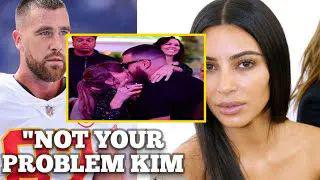
 CELEBRITY3 months ago
CELEBRITY3 months agoBreaking News: Kim Kardashian has announced that she is pregnant with Travis Kelce’s child. According to sources, Kardashian made the announcement during a private event, leaving many in disbelief and Taylor Swift is…. See More
-

 CELEBRITY3 months ago
CELEBRITY3 months agoBreaking news: Suri Cruise 18-year-old daughter of Tom Cruise and Katie Holmes, spotted crying on phone while out and about in New York, after she got a call that her mother Katie Holmes and estranged father Tom Cruise has been….See more
-
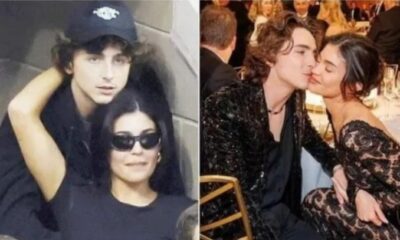
 CELEBRITY3 months ago
CELEBRITY3 months agoCongratulations: Kylie Jenner, 27, is engaged to boyfriend Timothée Chalamet I, 28, after the Actor recently threw his fiancée Kylie Jenner a LAVISH Surprise Party for her birthday and also announce they are expecting a… See More
-

 CELEBRITY4 months ago
CELEBRITY4 months agoUNEXPECTED ANNOUNCEMENT: Travis Kelce Announces Retirement from Kansas City Chiefs Due to His…..
-

 CELEBRITY4 months ago
CELEBRITY4 months agoNews Update: Kim Kardashian Criticizes Simone Biles’ Gold Medal Win: ‘She Doesn’t Deserve It – All She Did Was Nonsense and Simone Biles Response was…Read More
-

 CELEBRITY7 months ago
CELEBRITY7 months agoTravis Kelce sends a clear message to Kim Kardashian, Kayla Nicole, and others with a bold move
-

 CELEBRITY1 month ago
CELEBRITY1 month agoBreaking News: Just Now Kim Kardashian has announced that she is pregnant with Travis Kelce’s child. According to sources, Kardashian made the announcement during a private event, leaving many in disbelief and Taylor Swift is…. See More
-
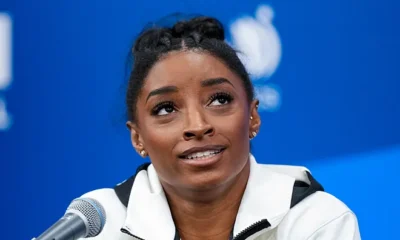
 CELEBRITY5 months ago
CELEBRITY5 months agoJonathan Owens gifts shocking present to Simone Biles ahead of 2024 Olympics Games
